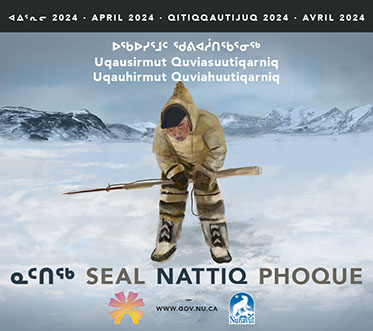Social activist comes armed with tradition
Inuk councillor seeks cures for city’s malaise
GREG YOUNGER-LEWIS
Annie Gordon wants to use old laws to do Iqaluit politics in a new way.
The results could be revolutionary – and expensive.
Gordon, who harvested more votes than any other candidate in the Oct. 20 municipal elections, wants city council to step outside its normal boundaries of business, and wade into the world of social programs. She says this could include justice programs, parenting programs, and whatever else would fit into a more “holistic” approach to healing the city’s social malaise.
Gordon argues that although such programs would be completely new to the city’s jurisdiction, this shouldn’t stop the council from looking into expanding its mandate. Until now, Iqaluit council, like municipalities across the country, has focused on maintenance issues such as fixing roads, treating sewage, and processing garbage.
If Gordon can’t find municipal funding for the city to get involved with social programs, she wants to see the city network more with organizations and governments working in those areas.
“We’re a community so we need to be able to work together,” Gordon said in an interview. “We shouldn’t be so divisionalized, that’s not how we are as Inuit people. We included everybody.”
Gordon’s push for change stems from an Inuit Quajimajatuqangit workshop she attended this past summer. Government workers, including Gordon who is a policy analyst for the department of justice, assembled for a week at a bed and breakfast in Iqaluit and learned from elders about mediation and how to live out on the land.
“There were so many things to learn from that [workshop], traditional ways of how they dealt with things, their own laws, their own human relations,” Gordon said.
The classes were only a chapter in Gordon’s efforts to return to her cultural roots. After growing up in Iqaluit, she moved to southern Ontario to study hairdressing. Within a year, she was back in the North, where she worked as a counsellor at the Isuarsivik Treatment Centre in Kuujjuaq. But when her grandmother Naki Ekho fell ill, Gordon returned to Nunavut’s capital and started learning more about traditional Inuit ways, especially from her mother who grew up on the land.
Far from being a political animal before this election, Gordon says she needs to research how she can turn her activist goals for council into a reality. Before she’s sworn in as a councillor, Gordon will have only seen one council meeting in action, and is the first to admit she has a lot to learn.
But her political inexperience doesn’t mean she isn’t a presence on council. Gordon received an impressive 944 votes in the election, more than everyone else on the ballot, including several incumbents. The strength of this mandate is difficult to judge because each voter has eight votes for council, which means Gordon could have technically been each voter’s eighth choice.
Gordon ran on a campaign to bring more Inuit representation to council, which is now made up of four Inuit and four non-Inuit councillors, plus an Inuk mayor.
In light of this, for Gordon, the message from Inuit voters is clear.
“They must have wanted to start taking ownership of our community,” Gordon said.
However, Gordon’s priorities match many of the other councillors’ projects, Inuit or not. Most candidates focused their campaigns on the importance of finding and changing problems in the department of public works, which has seen three fatal accidents involving city vehicles in less than three years. Housing also topped the list of priorities.
Even when it comes to Gordon’s plans to expand council’s mandate to include social programs, her proposal may not be unique.
Outgoing mayor John Matthews said other councillors have tried before to tackle the city’s social problems, from alcoholism to suicide to youth crime.
Having sat on city committees and council and served as mayor for the past nine years, Matthews cautioned that the city can’t afford to get directly involved in social programs.
“The municipality is very limited in its resources,” Matthews said. “It doesn’t have the money to build houses.”
But Gordon’s drive for a stronger IQ presence in municipal politics doesn’t have to be expensive. As Andrew Tagak Sr., IQ coordinator for the territorial department of health and social services, points out, using Inuit traditional knowledge can be as cost-free as increasing the amount of networking the council does with other groups and governments.
In fact, Tagak said, more IQ in Iqaluit can only improve the city’s well-being.
“I think it’s an excellent idea,” Tagak said. “Everybody’s voice will be heard and everybody could be helped.”
Gordon and other councillors, as well as the new mayor, will be sworn in at 5 p.m. on Nov. 3 at the Frobisher Inn.





(0) Comments